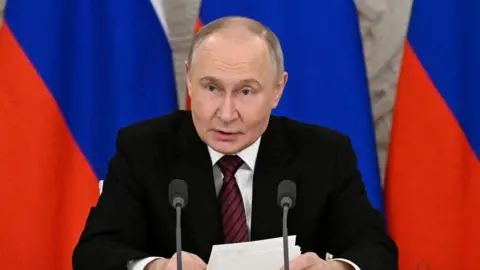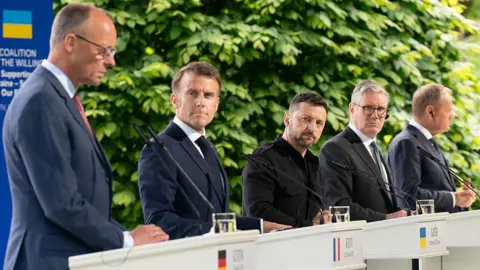Putin calls for “direct” and “immediate” dialogue with Ukraine

 Reuters
ReutersRussian President Vladimir Putin called for “direct negotiations” with Ukraine, saying they should “start delays as early as May 15.”
“We seek serious negotiations … to eliminate the root causes of the conflict and start moving towards lasting peace,” he said in a rare late-night speech on the Kremlin on Saturday.
A few hours later, European leaders, including British Prime Minister Sir Kyle Stamer and French President Emmanuel Macron, visited Ukraine and urged Russia to agree to an unconditional 30-day ceasefire.
Kremlin spokesman Dmitry Peskov has said Moscow will “have to think through this point” – but warned that “it is useless to try to put pressure on us”.
Putin said in a statement that he “does not rule out” the negotiations – the talks he proposed should be held in Istanbul, Turkey’s largest city – could lead to a “new ceasefire, a new truce.”
The Russian leader said he will talk to Turkish President Recep Tayyip Erdogan on Sunday to discuss details.
Kiev has not responded to the invitation, the same day that European leaders travelled to the Ukrainian capital and called on Moscow to agree to a one-month ceasefire, starting Monday.
Leaders of France, Germany, Britain and Poland – so-called part “A coalition of willingness” – Hosted by Ukrainian President Volodymyr Zelensky and attended a joint press conference during the trip.
They warned that “new and large-scale” sanctions will be imposed on Russia’s energy, while the banking industry should not agree to an unconditional 30-day ceasefire in the air, at sea and on land.”
 Getty Images
Getty ImagesThey also said they had discussed the proposal with Donald Trump. Sir Kyle later told the BBC The U.S. president is “absolutely clear” that their proposal for an immediate ceasefire is “a need that must be met.”
After the meeting – Putin hosted Victory Day celebration in Moscow One day ago – Zelensky thanked the gathering leaders for their “stand” with Ukraine.
“Today, we will focus on how to build and ensure true and lasting security,” he said.
Peskov of the Kremlin responded to the proposal, saying: “This is a new development. But it is useless to try to put pressure on us.”
Russian state media also quoted him as saying that European rhetoric is “usually confrontational and not intended to restore our relationship.”
Moscow had previously stated that the West must first stop military aid to Ukraine before considering a ceasefire.
Putin later issued his own statement, video showing reporters gathering in the halls inside the Kremlin.
“This will be the first step towards a long-term, lasting peace, not the prelude to more armed hostilities after the Ukrainian armed forces acquire new arms and personnel, after the craziest war trench trenches and the establishment of new command posts,” he said.
“Who needs such peace?”
Putin also accused Ukraine of repeatedly failing to respond to multiple ceasefire proposals in Moscow, including Stopped for 30 days in attack on energy infrastructure And last month’s Easter truce.
The day after Moscow agreed to stop targeting Ukraine’s energy infrastructure, Zelensky told EU leaders that “nothing has changed” and the attacks continued.
Another ceasefire for Putin was aligned with World War II commemorations in April. It ends on Saturday local time (21:00 GMT).
Kyiv rejected a three-day ceasefire, calling it a “drama performance.” Instead, Zelensky reiterated his call for a longer truce for at least 30 days.
Thursday – the same day the so-called ceasefire came into effect – Ukraine accused Russia of more than 730 violations and said it was making a “appropriate response”.
Russia’s defense ministry insists that the truce is before accusing Ukrainian illegal acts.
“Nevertheless, we are still providing the Kiev authorities with resumption negotiations … to resume direct negotiations, and I stress that there is no premise,” Putin said on Saturday.
The last direct negotiation between Moscow and Kiev came after the full-scale invasion of Ukraine three years ago.



